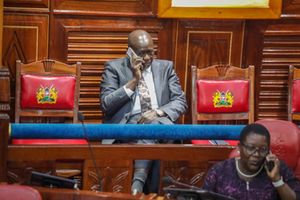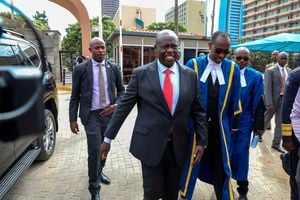
A youth protests along Moi Avenue in Nairobi during the anti-Finance Bill protests on June 30, 2024.
The economy runs on trust and confidence. In that order. If we have trust in the leadership, we are confident that they will walk the talk. Our responses to their policy initiatives will be as expected. But when there is a trust deficit, policy choices do not yield the expected results.
A president may be trying to stimulate the economy. But if we do not trust his ideas, we will not respond – particularly because response requires investments on our part. Put it this way, would you invest your savings or borrow money to put in the county aggregation centres? Related, no bank will lend you money on the strength of locating a business in such a centre!
Businesses rely heavily on trust and confidence. In fact, the phrases tone at the top, and trust deficit are borrowed from the private sector.
Routinely businesses ask themselves, do you trust the government to follow through with the plans they announce or will they hit you with frequent policy changes? Can you trust their numbers? Most decisions and actions by businesses, consumers and analysts, reflect the level of trust and therefore confidence, that they have in the government leadership. Here are a few examples.
Liz Truss became famous as the shortest UK prime minister to ever serve, lasting less than two months. On taking office two years ago, she and her finance minister announced their intention to cut taxes, but forgot what really matters – cutting expenditure. The markets reacted swiftly. Within hours the pound was hemorrhaging. The markets realised that Truss was proposing unfunded expenditures, which would lead to more borrowing and higher interest rates, and reacted accordingly.
This week, President William Ruto suffered a similar fate over his expenditure plans. While he did not leave office, he was forced to dismiss his government. Thanks to the amazing Gen Z, widespread anger has been boiling over into the streets for weeks. This popular revolt forced him to abandon the tax increases contained in the finance bill 2024. That created a funding gap of Sh346 billion. But he proceeded to sign the expenditure law, leaving himself, much like Truss, with an approved, but unfunded budget.
In response, Moody’s, the credit rating agency, down-graded Kenya’s credit rating, pushing it further into junk bond territory, with a negative outlook. In their view, things are not likely to improve soon.
They come to this view because Dr Ruto will have to borrow or cut expenditure. He has announced plans to do both. In Moody’s assessment, he is more likely to borrow than cut expenditure. Significantly, he has signed into law the unfunded spending plans. There is nothing stopping the accounting officers from spending what is in the law!
Before you slam Moody’s for the downgrade, remember that Moody’s analysts, like the Gen Z, also read the Constitution. They know that it provides a mechanism for continuity of government when the approved budget is delayed. There was no reason for President Ruto to hurriedly sign the unfunded budget. The analysts do not trust that he will reduce the expenditure. In their distrust, they join the Gen Z and Kenya’s financial markets.
Government borrows every week. Last week, Treasury was in the market with a Sh20 billion bond. The skeptical market only agreed to lend government Sh486.5 million, equivalent to 2.4 per cent. Like Moody’s, the market is saying we do not believe you. When the government returned to the market this week, it had to part with 16.82 per cent interest rate, to attract Sh10 billion for three months.
The Gen Z revolution is partly about repairing trust. They have reminded the Republic a critical point. The right people in politics translates not just to better policies, but crucially trust and credibility, without which the economy cannot function properly. The revolution has reminded us why it is important for people to take interest in politics.
Ultimately, the citizens may once again decide to delegate their sovereign power. That is why the IEBC reforms are critical. One plank lagging behind is the reform of the registrar of political parties. Without it, accountability will remain shallow. The original sin was the defection of UDM and Jubilee MPs in September 2022. Their action enabled the wasteful Executive to have their way. Such unlawful defection is the very thing the registrar’s office was created to prevent.
One of the most endearing aspects of the Gen Z revolution is overcoming fear. Even in the face of abductions, and disappearances, they have remained steadfast. Meanwhile many old-style politicians have been lying low, afraid that the regime will come after them. It begs the question though, doesn’t it, why would that be?
President Ruto’s stated intentions of pursuing a broad-based government have come under some criticism. Some pundits are mad that the opposition should not be propping up a failing president. But one thing is for sure. The Kenya Kwanza regime came into office with the narrowest of margins. Just 1.64 per cent of the vote!
That margin was vigorously disputed, but upheld by Supreme Court. Strangely though, and in a rather usual and angry tone, the court threw choice epithets at the litigants. All water under the bridge. In hindsight, however, the KK should have started building bridges from the get go, not throw their weight around in hubris.
The Gen Z revolution is about rebuilding institutions, to restore trust and confidence. True, institutions are run by people, and that rebuild requires a broad-based consensus. But it will come through the streets, not deals by the political class, behind closed doors.
@NdirituMuriithi is an economist










